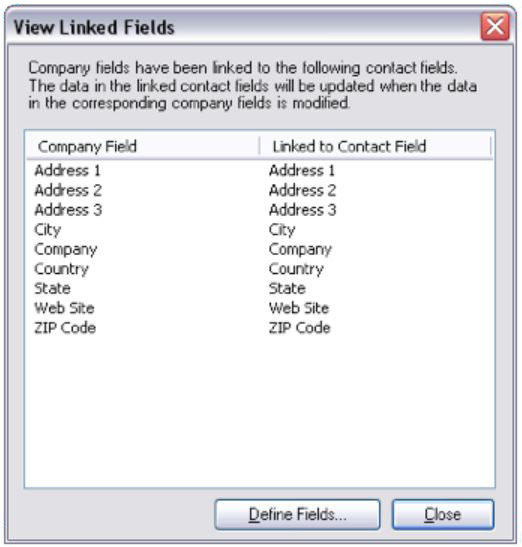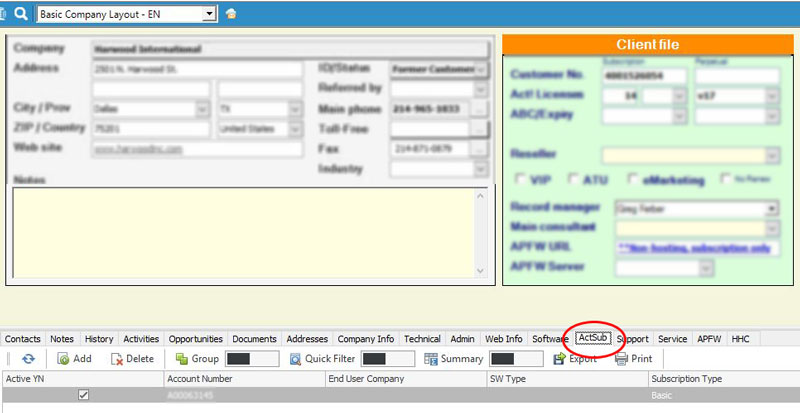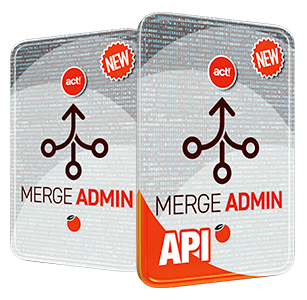The Company feature within Act! is a powerful way to update one or more contacts with account level field changes, while significantly enhancing the way businesses manage their CRM data. The trouble with this feature for Act! users, though, is that Act! is a “Contact centric” CRM, meaning Contact records tend to be used more than companies, and are therefore much more current than the Companies they’re linked to
Why is this so?
Act! users are typically Business-to-Contact oriented, meaning most new data is either read from or written to the contact records, and not the Company records to which they’re linked. We can debate the relative merits of this approach to the data, but this is how most Act! users have historically been wired. If you think about the most popular commercial sectors for Act!, they tend to be small businesses or service professionals like mortgage brokers, wealth managers, and real estate agents, all of whom deal with their customers at the “contact” level.
Company Table Linkage

Why it matters for custom tables
This Company feature has gained a new utility for Act! users with the advent of custom tables and Act! Premium Plus (expected out late February 2018), because vital custom table data can now be stored both at the contact & company level for simpler more intuitive custom tables management.
But what are custom tables?
Custom table technology enhances the Act! program significantly by allowing better tracking of transactional data in a way traditional Act! databases could not, providing the ability to record virtually unlimited custom records under a single contact, company, group, or opportunity (click HERE to learn more about custom tables). Some practical applications for custom tables would be to track contracts, quotes, products purchases, mortgages, insurance policies, or service history under one contact.
Not surprisingly, the company feature in Act! can further enhance the use of custom tables, as well. Traditionally stored under contacts, custom records can be configured to automatically attach custom tables to their linked company also, to dramatically simplify navigation. Imagine, for example, trying to ascertain whether a Company has a service contract in place with your business, and having to sift through each linked contact to find such a custom record? Valuable time could be wasted and important data missed. However, custom tables can easily be configured to link all records under a contact to their associated company as well, allowing users to easily pivot to the company level for better visibility of the data at the account level.

Like any feature within Act!, though, if too many manual steps are required, it will suffer disuse, and such is the case with the Contact-Company linkage. For instance, once a Company is created from a Contact, there is no way in Act! of passing field data from the Contact up to the Company. If the contact data is, in fact more current, Company updates would have to be made manually - which is both unreliable and time-consuming. This one-way flow of data limits the Company linkage feature’s usefulness, and from our perspective, reduces Act! to being a Contact Management system, and not a fully featured CRM.
There are others issues limitations of the company feature, as well:
- You cannot assign a primary contact for marketing purposes, nor can you enforce a single primary account
- Customer records tend to be created only at the contact level initially because users don’t always know if additional company employees will be added later. It would feel unnatural for most Act! users to create a company with only one contact, if there was no other reason for doing so.
- Without a linked Company, any custom tables created at the contact level stay at the contact level.
- You cannot mail-merge with the company table
- The Company Creation feature built into Act! with v16 creates Companies with out populating the linked fields at all, making the data gap between the contact & company fields more pronounced
- If you create a Company from a Contact that has custom tables, the custom tables do not automatically attach to the new linked Company

Primary Contact Plus
It was for these reasons that we created “PrimaryContact Plus”. Designed initially for internal use only, Primary Contact Plus allowed our team to force updates from the contact to the Company, and more easily ensure there was a single primary contact for each company.
As you might guess, it didn’t take long before we realized the commercial potential of this product, as Primary Contact Plus solved a number of problems for Act! Users. After installation, PC+ will enable users to select any primary contact within a company, push the contact field data up to the linked fields of the Company, and then down to the other linked contacts.
Moreover, new PC+ features allow you to do the following tasks in one step:
- Automatically link a contact to an existing company or create a new one
- Once linked, PC+ prompts the user to upload contact details to the company, and link whatever custom tables it had under the contact to the company
- Once the field data is uploaded to the Company, PC+ prompts the user to update all the other contacts linked to that company
- When that stage is complete, PC+ scans all the company’s linked contacts, deselects any others that might be marked as primary, and makes the newly selected contact the exclusive primary one.
- During last stage, PC+ collects all the custom tables under the contacts linked to that company and moves them to the new primary contact.
Primary Contact Plus reduces many cumbersome steps into one, and enables users to productively function at the contact level in their database, where they’re most comfortable, without forfeiting the benefits of having linked companies.
What’s more, because it either creates the company linkage or creates the company in one step, any custom tables under that primary contact get linked at the company level, too. With PC+, you can function at the contact or company level interchangeably with unprecedented uniformity of data and ease of use.
Primary Contact Plus is an absolute necessity for those using the company table a lot, and for those wishing to manage custom tables, and keep all contacts and companies up to date.




































